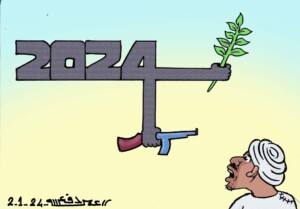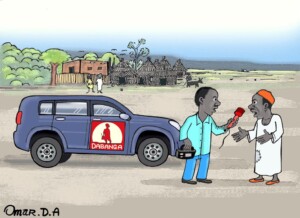Sudan opposition: New cabinet ‘an attempt to cover govt. failures’
According to the Sudanese opposition, the new cabinet adopted by the ruling National Congress Party (NCP) is solely an exchange of positions and an attempt to circumvent the failure of its policies.
 Downtown Khartoum (teachunousa.wordpress.com)
Downtown Khartoum (teachunousa.wordpress.com)
According to the Sudanese opposition, the new cabinet adopted by the ruling National Congress Party (NCP) is solely an exchange of positions and an attempt to circumvent the failure of its policies.
After an emergency meeting of ruling party officials in the presidential palace on Sunday, President Omar Al Bashir dissolved the National Reconciliation Government. In his speech to the nation the following day, he announced new measures to cut government spending. The 31 ministries would be reduced to 21. The number of ministries in the 18 states in the country would be downsized as well.
The president introduced Motaz Mousa, former Minister of Water Resources and Electricity, as new prime-minister. Bakri Hasan Saleh who served as both prime-minister and first-vice president since 2017, will stay on as first vice president. Darfuri official Osman Kibir will replace second vice president Hasabo Abdelrahman, who is as well from Darfur.
On Thursday, the NCP announced the merging of a number of ministries and a new formation of 21 federal ministries and 27 state ministries.
Former executive secretary of the UN Economic Commission for Africa Abdallah Hamdouk declined the post of Finance Minister. Al Bashir therefore decided to temporarily delegate the new prime-minister to Financial Affairs.
The previous Minister of Petrol, Azhari Abdelgader, will head the merged ministries of Petrol and Mining. Ahmed Bilal Osman was appointed Minister of Interior Affairs and Khidir Gasmallah Minister of Water Resources and Electricity.
The ministers of Foreign Affairs (El Dirdeiri Mohamed Ahmed), Defence (Lt. Gen. Ahmed Bin Auf) and Presidential Affairs (Fadul Abdallah) will keep their posts.
Police Lt. Col. Hashimi Osman was appointed Governor of Khartoum state, replacing Abdelrahim Hussein.
The 21 new or re-appointed ministers and 27 state ministers were sworn-in by the Sudanese president, in the presence of chief justice Haidar Dafallah and first Vice-President Bakri Hasan Saleh.
Sudan is suffering from chronic hard currency shortages and soaring inflation, leading to recurrent shortages in commodities like bread and fuel. The liquidity of the local currency rapidly dwindled as well. Some banks have now set the daily withdrawal limit as low as SDG 500 ($ 18*).
During the swearing-in ceremony, Al Bashir said the measures are part of major political and economic reforms in the country. The new government will give hope again to the Sudanese by urgently dealing with the economic crisis.
Opposition parties however have downplayed the importance of the new steps.
The chairman of the Sudanese Congress Party, Omar El Degeir, commented earlier this week by saying that the ruling party always readjusts its cabinet when the problems in the country become acute. However, replacements of ministers do not resolve the country’s crises. Administrative reforms are the most important demand, he said.
Mohamed Diaeldin, spokesman for the Baath Party, which is member of the National Consensus Forces (NCF, a coalition of opposition parties) described the restructuring of the cabinet as “just a recycling of elements of the regime”.
“Corruption has become institutional in Sudan” – opposition member
According to Dialeldin, the ruling party opted for “a renewed exchange of positions to ensure control of the executive body’s leadership and, at the same time, to circumvent the failure of its policies that have brought the country to the abyss.
“The dissolution of the National Reconciliation Government means a recognition of the failure of the National Dialogue and its recommendations,” he added.
“The crisis in the country is deep, and should not be trivialised by replacing or recycling persons.”
Corruption
A senior member of the Popular Congress Party, established by the late Dr Hasan El Turabi, has claimed that the shortages of bread and fuel in the country are caused by mismanagement and fraud.
“Corruption has become institutional in Sudan,” El Amin Abdelrazig, the party’s political secretary stated in a symposium in Khartoum on Thursday.
He said that the volume of gold smuggled abroad last year amounted to 250 tons – out of a production of 300 tons.
The head of the political department of the ruling National Congress Party, Abdelrahman El Khidir, acknowledged that the estimated revenues of gold smuggled out of the country last year are about $6 billion.
The spokesman of the Baath Party pointed as well to widespread corruption. He referred to the anti-corruption campaign announced by President Al Bashir in end March this year. “This is fake. It just falls within the framework of the various conflicts within the power centres of the ruling party.”
Diaeldin considers “the inability of the regime to fight corruption as evidence of the involvement of its members in corruption and their protection.
“Efforts to fight fraud can only be achieved by the overthrow of the corrupt regime itself,” he added.











 and then
and then